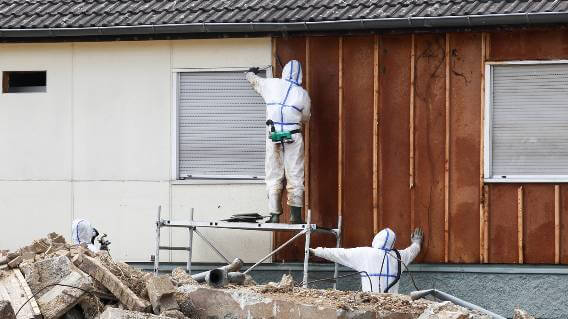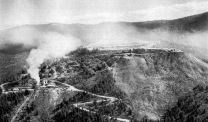Asbestos Abatement Laws Being Enforced
Legislation & LitigationWritten by Tim Povtak | Edited By Walter Pacheco

Cities and counties throughout the country are paying the price for failing to adhere to the tightening safety protocols that cover the handling and disposal of toxic asbestos in existing structures.
Dothan, Alabama, became the latest city to pay for its negligence, agreeing to a $3,000 settlement with the state’s Department of Environmental Management, stemming from its failure to get a proper asbestos-abatement inspection.
The city, which is in the middle of a downtown rebuilding project, demolished five structures recently, but only had one commercial building properly inspected. The other four were residential, but also required inspections because they were linked to the project.
Typically, single family homes that have never been used for commercial purposes are exempt from requiring asbestos inspections, along with residential structures with four or fewer units.
“It was a misunderstanding, but we are glad and willing to comply with ADEM (Alabama Department of Environmental Management),” said Dothan mayor Saliba.
States Becoming More Vigilant
States are becoming more vigilant in responding to environmental concerns and the dangers of legacy asbestos as the country moves closer to legislation that would ban the toxic mineral completely.
In April, the U.S. Environmental Protection Agency proposed a potentially historic ban that would prohibit all current uses of chrysotile asbestos, the only known type of raw asbestos still being imported.
In May, the EPA also proposed a new rule that would require stricter reporting and record keeping for uses of all asbestos products, along with exposure-related information.
As part of the Clean Air Act, the EPA established the National Emission Standards for Hazardous Air Pollutants – which included asbestos – more than 50 years ago.
Almost 40 years ago, the EPA delegated primary authority for the implementation and enforcement of the NESHAP to states, which still allowed for federal government oversight
Asbestos, a naturally occurring mineral, was once celebrated for its ability to fireproof and strengthen almost anything with which it was mixed. It was used ubiquitously through much of the 20th century in residential and commercial structures.
Unfortunately, it also can be toxic as it ages and fibers become airborne. The inhalation or ingestion of microscopic asbestos fibers can lead to serious health issues, including mesothelioma cancer, asbestosis and lung cancer.
The intent of the NESHAP is to minimize the release of asbestos fibers into the air during the handling, processing and disposal of asbestos-containing materials. It is aimed particularly at major renovations and demolitions of structures built before the turn of the century, and the legacy asbestos that remains.
The purpose is to protect public health.
Violations Happening Everywhere
According to the Alabama Department of Environmental Management report in Dothan, an asbestos inspection and the subsequent removal must be done by accredited inspectors and workers. The certification also must be done before any work can begin.
Dothan was far from alone in violating the rules. Other recent examples in 2022 include:
- The Oregon Department of Environmental Quality fined Banyan Tree Investments LLC a total of $7,200 for allowing an unlicensed person to do the asbestos abatement during a renovation project at C-Bar in Portland. Multnomah County (which includes Portland) and a private contractor were fined a combined $5,400 for failing to adhere to asbestos safety protocols in another case.
- Michigan Department of Environmental Quality fined the city of Detroit a combined $24,500 this year for numerous safety violations involving asbestos during a blight-removal campaign that led to the demolition of several houses.
- The Iowa Department of Natural Resources fined the Cedar Rapids School District $4,500 and the company renovating one of its schools another $6,500 for failing to adhere to asbestos regulations earlier this year.
- Lobar Inc. pleaded guilty to charges at the U.S. Attorney’s Office, Middle District of Pennsylvania, that involved starting a demolition project at a former weaving mill prior to removing all asbestos containing material, as required by federal law. The amount of the fine has yet to be announced.
The penalties and punishment for not following the rules regarding toxic asbestos can be considerably tougher at the federal level.
For example, Bobby Babak Khalili of Los Angeles recently pleaded guilty in U.S. District Court in Nevada to intentionally violating asbestos cleanup laws while renovating two apartment complexes in Las Vegas.
His sentencing is expected to come later this month, but he could face up to five years in prison and $250,000 in fines.






